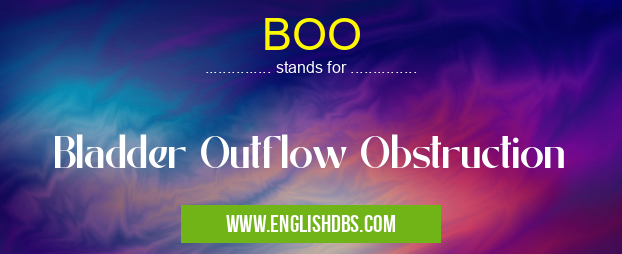What does BOO mean in BRITISH MEDICINE
Bladder Outflow Obstruction (BOO) is a condition that occurs when there is an obstruction or blockage in the bladder neck or urethra, hindering the flow of urine from the bladder. This obstruction can lead to various lower urinary tract symptoms and complications.

BOO meaning in British Medicine in Medical
BOO mostly used in an acronym British Medicine in Category Medical that means Bladder Outflow Obstruction
Shorthand: BOO,
Full Form: Bladder Outflow Obstruction
For more information of "Bladder Outflow Obstruction", see the section below.
Causes of BOO
- Benign Prostatic Hyperplasia (BPH): Enlargement of the prostate gland is the most common cause of BOO in men.
- Urethral Strictures: Narrowing of the urethra due to scarring or inflammation.
- Bladder Neck Contracture: Tightening of the bladder neck muscles.
- Neurological Disorders: Conditions affecting the nerves that control bladder function, such as spinal cord injuries or multiple sclerosis.
- Tumors: Prostate cancer or other tumors in the bladder or urethra.
Symptoms of BOO
- Difficulty starting urination (hesitancy)
- Weak or intermittent urine stream
- Frequent urination (especially at night)
- Incomplete emptying of the bladder
- Straining or pushing to urinate
- Urinary tract infections (UTIs)
Consequences of BOO
- Urinary retention (inability to urinate)
- Bladder stones
- Kidney damage
- Sepsis (infection in the bloodstream)
Diagnosis of BOO
Diagnosis of BOO typically involves:
- Physical examination: Rectal exam in men to assess prostate size and tenderness.
- Uroflowmetry: Measuring the flow rate of urine to detect any obstruction.
- Ultrasound: Imaging the bladder and urethra to visualize any anatomical abnormalities.
- Cystoscopy: Inserting a camera into the urethra and bladder to examine the structures directly.
Treatment of BOO
Treatment options for BOO depend on the underlying cause and severity of the condition:
- Medications: Alpha-blockers or 5-alpha reductase inhibitors to relax the prostate muscles.
- Surgery: Transurethral resection of the prostate (TURP) or laser ablation to remove obstructing prostate tissue.
- Urethral dilation: Using a balloon catheter to widen the urethra.
- Bladder neck incision: Cutting the contracted bladder neck muscles.
Prevention of BOO
While not all causes of BOO can be prevented, maintaining a healthy lifestyle can reduce the risk of developing the condition:
- Dietary modifications: Limiting caffeine and alcohol intake.
- Regular physical activity: Maintaining a healthy weight and improving blood flow.
- Prostate cancer screening: Early detection and treatment of prostate cancer can prevent BPH and BOO.
Conclusion
Bladder Outflow Obstruction (BOO) is a serious condition that can lead to significant lower urinary tract symptoms and complications. Understanding the causes, symptoms, and treatment options for BOO is essential for timely diagnosis and effective management. By following preventive measures and seeking medical attention promptly, individuals can maintain optimal bladder health and prevent the development or progression of BOO.
Essential Questions and Answers on Bladder Outflow Obstruction in "MEDICAL»BRITMEDICAL"
What is Bladder Outflow Obstruction (BOO)?
Bladder Outflow Obstruction (BOO) is a condition that occurs when the flow of urine from the bladder is blocked. This can be caused by a variety of factors, including an enlarged prostate, urethral stricture, or bladder stones.
What are the symptoms of BOO?
The symptoms of BOO can vary depending on the severity of the obstruction. Common symptoms include difficulty urinating, weak urine stream, frequent urination, and a feeling of incomplete bladder emptying. In severe cases, BOO can lead to urinary retention, which is the inability to urinate at all.
How is BOO diagnosed?
BOO is diagnosed based on a patient's symptoms and a physical examination. Your doctor may also order tests such as a urinalysis, urine flow study, or cystoscopy to confirm the diagnosis.
How is BOO treated?
The treatment for BOO depends on the underlying cause. Treatment options may include medication, surgery, or a combination of both.
What are the complications of BOO?
If left untreated, BOO can lead to a number of complications, including urinary tract infections, kidney damage, and bladder stones. In severe cases, BOO can even be life-threatening.
Can BOO be prevented?
There is no sure way to prevent BOO, but there are steps you can take to reduce your risk. These steps include:
- Maintaining a healthy weight
- Exercising regularly
- Eating a healthy diet
- Quitting smoking
- Limiting alcohol intake
BOO also stands for: |
|
| All stands for BOO |
